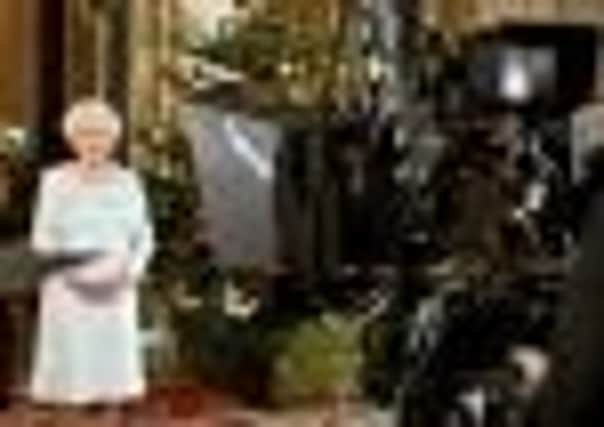Leaders: Words of quiet assurance in our changing world | Must try harder, Mr Stevenson


Christmas would just not be Christmas without the message from Her Majesty, and the millions who switch on to watch – some this year in three dimensions – are a testimony to its importance to the United Kingdom.
This year, the Queen used the broadcast to respond to the outpouring of affection and enthusiasm shown by the nation during her Diamond Jubilee celebrations. She described how she was left humbled by the huge crowds that turned out to mark her milestone.
Advertisement
Hide AdAdvertisement
Hide AdListening to the message, as opposed to those clipped vowels, it was possible to discern a genuine note of gratitude, perhaps even relief, as Her Majesty spoke of being struck by the “strength of fellowship and friendship” shown by well-wishers, particularly during the Thames Diamond Jubilee Pageant when more than a million people lined the banks of the river in London.
Rational beings might ask why despite, as the Queen herself pointed out, the cold conditions and persistent downpours, the crowds who witnessed the once-in-a-lifetime flotilla were “undaunted by the rain” and turned out in such large numbers to mark what was, for the monarch, a momentous year.
Well, as this year draws to a close for the Queen, it is worth remarking that, by careful planning and what might (crudely though not very regally) be called “spin”, the monarchy has regained much of the popularity it lost in the wake of the death of Princess Diana and, more recently, by the behaviour of certain members of the Royal Family.
More remarkable still is the fact that, in a time of economic upheaval, when there has been a diminution of respect for institutions and authority in general (in some way no bad thing if we are less deferential), those who hold republican views are still a small minority in this country. In theory, the idea that in the 21st century we still have a hereditary “ruler”, albeit a constitutional monarch with few remaining significant powers, is a puzzling anachronism. Why would anyone want that kind of arrangement, which goes back to feudal times and still has an air of the feudal about it, to continue?
The answer is probably that, in an age of unrelenting change, an era of uncertainty, an time of austerity, the ordinary people of the United Kingdom – including in Scotland – cling to the idea of the monarchy. The Queen, for them, embodies the idea of stability, security, and certainty.
Even north of the Border, that has been recognised, with the SNP, which once contained more than its fair share of fiery republicans, saying the monarchy would be retained were Scotland to vote for independence.
She may not put it quite this way, but as she looks back on this year, the Queen can take some satisfaction at a job well done.
Must try harder, Mr Stevenson
The late Reginald Victor Jones was a hero of the Second World War. His witty and learned book, Most Secret War, is a classic that chronicles the remarkable scientific feats that characterised his work for British Intelligence. For him to be described in the Scottish Parliament as “an absolutely crap lecturer” by a former student – the MSP Stewart Stevenson – is
unfortunate.
Advertisement
Hide AdAdvertisement
Hide AdMr Stevenson may have yawned his way through RV Jones’s lectures in Aberdeen
University’s Department of Natural Philosophy in the 1960s, but other pupils have a different recollection. Professor Joseph McGeough of Edinburgh University remembers a lecturer who took great pains to impart the principles of physics in an imaginative way – dead chickens were dropped from the ceiling to demonstrate Heisenberg’s Uncertainty Principle. His final lecture of the year in Marischal College at Aberdeen was eagerly awaited by students and he delivered the televised Christmas lecture at the Royal Institution more than once. In fairness to Mr Stevenson, the politician had the grace to describe RV Jones as a “great scientist” and later said he had an “absolutely amazing” war service. Moreover, he is hardly the only undergraduate to have failed to find himself on the same wavelength as a scientist blessed with formidable intellectual powers. As Mr Stevenson acknowledged – the remarks he made “may tell you something about the student as well as the lecturer”.
Nevertheless, Mr Stevenson should have thought before he spoke. RV Jones deserves to be remembered on the parliamentary record for his contribution to the war rather than for his failure to inspire one future politician.